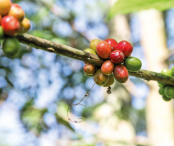
The Sridonoretno Farmers’ Association, in the region of East Java, Indonesia, has benefited extensively from the joint support provided by the ASEAN Farmers’ Organizations Support Programme (AFOSP) in collaboration with MTCP2.
Robusta coffee is one of the most important local products, and the AFOSP and MTCP2 have jointly facilitated extensive capacity-building initiatives, including on the cultivation of climate-resilient coffee through natural farming and natural pest management practices, harvesting techniques that lead to the selection of the highest-quality cherries, post-harvest processing, setting up collective processing units, and developing a network of new markets through coffee shops in Malang, Malang City, and Batu City.
The capacity-building and awareness-raising initiatives have translated, even before a change in practices, into a change of mentality behind those practices. As Mr. Siadi, Head of Quality Control for the Sridonoretno Association of Dampit Coffee Farmers, says: “We are now aware of the importance for coffee farmers to practice red cherry-picking and good post-harvest processing.” Eko Yudi Sukrianto, leader of the Association, backed him up: “Through the training that we received, we are now able to rate the quality of our coffee, which now yields up to 90% red cherry and is deemed enough to proceed to coffee bean processing.”
The results are impressive: coffee production increased by 200%, from 0.5 kg to 1.5 kg of green beans per tree; fungi diseases have decreased; coffee quality has improved; farmers’ profits have increased from 22,000 to 32,000 rupiahs (USD 1.45 – 2) per kilo of green beans, and the participation of women and youth is on the rise. Women are mainly in charge of coffee bean sorting, while the youth work in quality control, marketing, and cooperative development.

Comments are closed